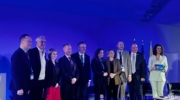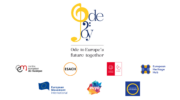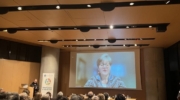Europa Nostra provides input for a new European Agenda for Culture
After participating in a first consultation meeting on a new European Agenda for Culture organised by the European Commission in Brussels in February 2018, Europa Nostra now submitted its views on the status quo and the potential revamping of cooperation in the cultural field at EU level (European Agenda for Culture – see below) via an online survey. This survey was launched by the European Commission to collect more input.
Europa Nostra’s top priorities for future EU policy collaboration on culture are:
- Sustaining the legacy of the European Year of Cultural Heritage 2018 by providing the necessary support to all cultural heritage stakeholders and also by:
- Developing a proper European Agenda for Cultural Heritage;
- Formulating policy recommendations to be implemented at European, national, regional and local level;
- Ensuring more and more easily accessible funding for culture and cultural heritage from various sources, both public and private;
- Ensuring an integrated approach to culture and cultural heritage.
Moreover, Europa Nostra recommends to finetune the objectives of a new Agenda and focus on “culture as a key resource for more inclusive and more cohesive societies” and “culture as a catalyst of creativity and sustainable development in our cities and countryside”.
With regard to working methods and organisational aspects, Europa Nostra strongly suggests to revise the current methods so as to make better and more efficient use of the existing European networks and platforms in the cultural field which are already co-funded by the EU (instead of passing through an additional selection and application process as it is currently the case). Likewise, the links between other EU-funded programmes and projects relating to cultural heritage should be strengthened according to Europa Nostra, for instance by making stronger use of the winners of the EU Prize for Cultural Heritage / Europa Nostra Awards to inform policies.
The European Commission will publish their proposal for a new European Agenda for Culture in May 2018.
Background information
The European Agenda for Culture is a strategic framework for developing cooperation among EU Member States in the cultural field – the basic document was adopted in 2007 but has not been updated since. In the light of this, the European Commission launched the consultation process on a new European Agenda for Culture.
The current European Agenda for Culture as adopted in 2007 defined three strategic objectives:
- Promotion of cultural diversity and intercultural dialogue;
- Promotion of culture as a catalyst for creativity in the framework of the Lisbon Strategy for growth, employment, innovation and competitiveness; and
- Promotion of culture as a vital element in the Union’s international relations.
Under the Agenda, multi-annual work plans for culture are adopted to further policy-cooperation between EU Member States (“OMC” expert groups) and a parallel “structured dialogue” takes place with cultural stakeholders on specific topics. The discussions among cultural stakeholders (summarised in reports) are intended to feed into the discussions among the Member States’ experts, who in turn, publish their outcomes in reports. Since 2008, 17 reports have been published.
So far, Europa Nostra has already participated in several of the “structured dialogues”, namely on participatory governance of cultural heritage (2015-16), on skills, training and knowledge transfer: traditional and emerging professions (2017-2018, see news item including link to report), and the brainstorming meeting on the contribution of culture to social inclusion on 17-18 April 2018 in Brussels.







